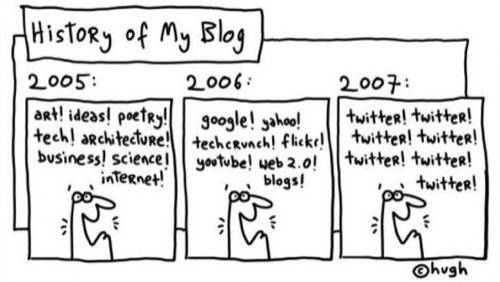While taking questions yesterday about alleged violation of anti-trust laws, Google execs including CEO Eric Schmidt reportedly told press that the company is, in the words of Reuters scribe Alexei Oreskovic, “looking at … ways of integrating microblogging capabilities, such as those popularized by Twitter, into its search product.”

That’s news to us. Everything these days is about Twitter, though. Go to a party–talk about Twitter. Have a blog? Talk about Twitter. Use Twitter? Talk about Twitter. Apparently we can add to that: facing legal pressure over allegedly anti-competitive business practices? Talk about Twitter. There’s absolutely no more information available about this – but below are three possible scenarios we can imagine for Google integrating microblogging into its search product.
The fact that Schmidt said what he did is just one reason to believe Google is going to do something with microblogging. There are several – most important is the fact that status sharing and activity streams are really useful, compelling and potentially valuable for both users and companies that dabble in them. Here’s how it might go down.
Real Time Search
The most logical integration of microblogging and search would be microblogging search. Google already indexes Twitter messages, in some ways better than Twitter does. We can imagine “real time” being an option just like web, news, images and blogs on Google search. Here at ReadWriteWeb we use this tool to have that experience already. There is a whole lot that can be done with something like Twitter search if the user accounts tweeting the twits and twats are taken into account. Check out the nascent awesomeness at Twazzup, for example.
This probably isn’t going to happen, though, as long as Twitter is the only microblogging game in town. There just isn’t a meaningful data set of publicly available status updates elsewhere. Facebook status messages would be great to search but that would contradict the fundamental nature of the site – and Microsoft has a lot of skin in the game there.
We’re hoping that open source microblogging technology from Laconi.ca will spread throughout the land and give engines something other than Twitter to search.

Hugh MacLeod, Why I Deleted My Twitter Account
Augmenting Pagerank
Inbound links are the primary way that Google determines what’s a good page to serve up for any search query. Fresh links from the micro-blogo-o-sphere could well augment the traditional metric with some timeliness.
This is something we explored yesterday in a post about Twitter and how it is not going to index the pages you share links to. It’s going to have 3rd party companies perform that function and maybe buy one or more of them.
We don’t think Google is going to integrate microblogging in this way though. Why not? Because it would be silly. Google is already fast enough, good enough and doggone it – people like it.
What Are You Doing?
You know what’s most likely? That Google will add the equivelant of “what are you doing?” to its search interface. Perhaps “what are you searching for?” Messages posted and available to read through that interface will be to and from your Google Contacts. (That’s the people you Gmail with, basically.) Google is making a big push for people to take their Google Profiles more seriously and one consequence of that could be a well populated social graph for users.
Friends could help answer the questions you’re asking of Google or they could let you know what they are doing, like a home town version of Google News. If you check out Google Friend Connect, imagining that integrated into search isn’t hard at all.
Social search and status sharing. It’s a lot less crazy than Google’s search wiki.
The paradigm of status sharing and activity streams is just too compelling for Google to stay out of it. Maybe they will buy FriendFeed. Maybe they will build something themselves and maybe it will be good.
Schmidt’s hint yesterday only makes sense, though. How can you imagine the integration of microblogging into search looking?
The Schmidt story was found in Brad Williamson’s excellent FriendFeed group Media News and Analysis – thanks Brad!









